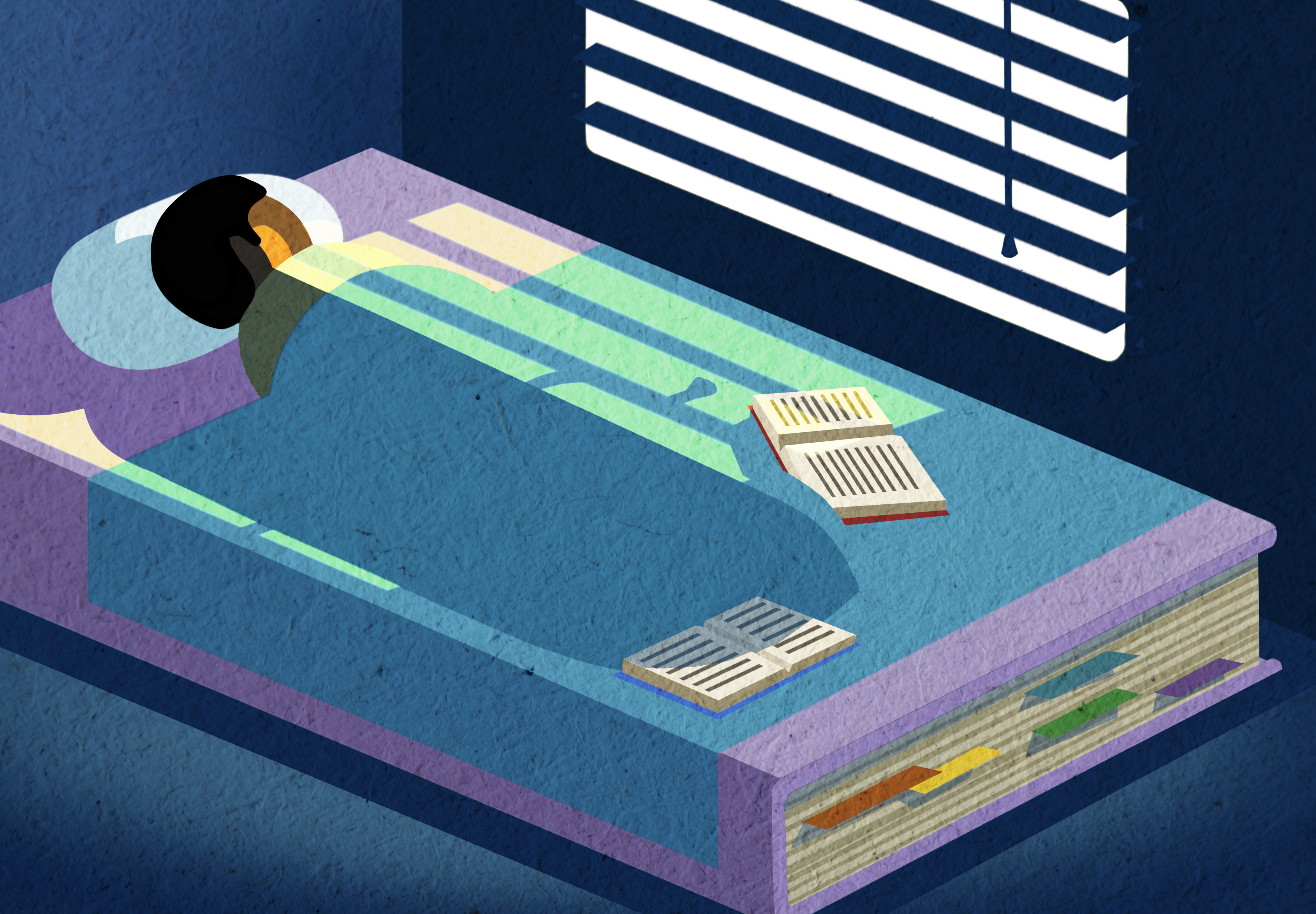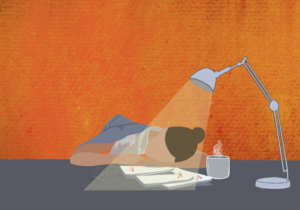For how much Georgetown students seem to despise the absurd workload, competitive culture, and challenging requirements of our classes, we sure do revel in our suffering. Though conversations with friends revolve around the unbearable quantity of assignments and the number of hours we’ll need to lock ourselves in Lau, I sense the undertones of gratification, as though we love to hate our own grievances. And though I repeatedly hear laments like “I just want to sleep,” I rarely see my fellow classmates seizing the opportunity when it arises, or even expressing the intention to make tangible changes to daily habits.
What I do see is an obsession with work, productivity, and just doing something, because am I even a good student if I’m not studying?
Much can be said about the undeniably destructive pedagogy and academic demands of elite institutions, for which Georgetown is no exception. As students, we are bombarded with so much homework that we wonder if our professors know that we have other classes, too. It feels like 100-page reading assignments and daily discussion posts are handed out like candy, and we are obligated to either organize and prioritize, or suffer the consequences.
But while we are at the mercy of our classes’ demands, it seems we have internalized our role as students, conflating productivity with a hyper-obsession of work. We lose a day to the windowless obscurity of Lau 2, convinced that the 8-hour stint is necessary. We complain to our friends about our assignments, but it turns into a subtle competition. The habit becomes a compulsion that leaves us uncomfortable with an empty g-cal. We develop anxiety when we reach the temporary end of our workload, and rather than enjoy the moment of peace, we dive back in, determined to “work ahead.”
This, recent research reveals, is a psychological obsession. Coined studyholism, compulsive overstudying develops as a tool to reduce academic anxiety and avoid the dread of potential academic catastrophes. Studyholics often feel greatly responsible for their performance, resulting in increased anxiety and depression, headaches and digestive issues, and decreased sleep quality. In turn, students are less productive, less efficient, and less able to concentrate on tasks. This may lead to more time studying because it takes twice as long to get an assignment done.
The students who do not share this compulsion may feel frustrated on this campus; the hyper-productive culture means studying is one of the most common ways to socialize during the week. I frequently join my friends in the HFSC whether or not I have an upcoming assignment. Rather than just sit there, I start on the next thing on my to-do list, even if it’s not due for another week. The conduct of my peers therefore trains my own behavior, which reaffirms and perpetuates campus culture.
However, the real problem is not overstudying on an individual level; it’s the culture that idolizes productivity. When work for work’s sake is valued over a healthy lifestyle, students feel pressured to perform and guilty for not meeting the standard. Mental health issues, exhaustion, and taxing workloads become trophies of success.
Georgetown did not develop this culture in isolation. Political scientists and psychologists have correlated productivity with internalized capitalism, suggesting that the damaging link between achievement and worth is the result of an increasingly capitalistic society. Fueled by the fear of falling beyond on the social and economic ladder, we hastily join the productivity trend, romanticizing the busy lifestyle because we have equated it with a higher status.
This trend only escalates after college. The ADP Research Institute recently found that workers are logging over 9 hours of unpaid overtime per week, an increase from 7.3 in the previous year. Students and workers are statistically spending less time with family and friends because of performance incentives. This workforce culture has become so harmful that younger generations have spearheaded the recent trends of “Quiet Quitting,” “The Great Resignation,” and “Anti-Work” in backlash.
As students, we are in a precarious situation. We are required to commit our time and energy to our classes, falling into the system that our culture has created for us. Even if we want to reject the norm, studying hard is a means of commiserating with our classmates, and so renouncing our habits may also disengage us from social opportunities. It doesn’t help that the boundary between work and personal life is dismally blurry, and so it’s easy to slip back into work even when we’re at home.
So how do we break the cycle if it is so ingrained in our culture and seemingly necessary to succeed in our classes?
It’s first important to realize that culture does not change without a change in behavior; reorienting a perspective means nothing if it does not inform how we act. And so to transform this culture of obsessive productivity, we have to commit to disrupting old habits and building new ones.
We have to start by taking rest seriously. Only about 2% of the population can actually function properly on 5-6 hours of sleep. Developmental research suggests sacrificing sleep for studying is highly correlated to decreased academic performance, and repeated sleep deprivation limits our ability to assess our own symptoms—while still experiencing them. There’s a reason why scientists recommend at least 8 hours of sleep per night. However much we believe we can—and are encouraged to—operate on less, we are not the exception. Breaking the cycle of hyper-productivity will require us to prioritize sleep in our daily schedules, like setting strict boundaries for a homework cut-off time. Sleep is not a bonus in the hustle of life—it’s a necessity.
Countering the capitalistic culture of productivity will also require us to engage in activities that directly oppose the norm. We can begin by seeking human connections outside of work settings, like casual meals, game nights, intramural sports, or just an unrushed midday coffee with a friend. These untimed, unproductive moments allow us to shift our focus from performance and efficiency to social, mental, and physical wellbeing.
Finally, we need to intentionally discern how we are studying. You may find that the 8 hours at your desk did not accomplish 8 hours worth of work. Numerous studies show we really can’t focus for more than 90 minutes at a time; after that, our efficiency plummets, even if we attempt to push through. Rather than dedicate several hours to the general goal of “studying,” consider setting specific tasks within a time frame. Outside of that time, find activities that refresh and re-energize—even if it feels uncomfortably unproductive at first.
The antithesis to hyper-productivity is not failure—it’s balance. We can begin to oppose this destructive culture by consciously prioritizing rest, relationships, and wellbeing over ironically unproductive study habits. Let’s take the time to assess our own habits—and maybe then we can leave this cult of productivity.





Beautifully written!